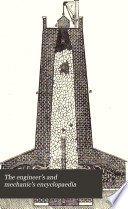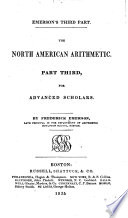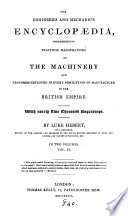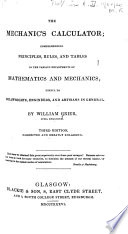 | George Combe - Education - 1834 - 144 pages
...bodies. Cohesive attraction. Capillary attraction. Gravitation. Laws of motion. Mechanical powers. The lever. The wheel and axle. The pulley. The inclined plane. The wedge. The screw. Mechanical properties of fluids. Specific gravity. Mechanical properties of air. On the... | |
 | John Radford Young - Mechanics, Analytic - 1834 - 302 pages
...parts of all machinery are called the mechanical powers. These are six in number, and are as follow : the Lever, the Wheel and axle, the Pulley, the Inclined Plane, the Screw, and the Wedge. The Lever (75.) A lever is a rigid bar or rod, moveable about a fixed point or... | |
 | Encyclopedias and dictionaries - 1835 - 208 pages
...weight, or resistance, to another. Q. How many Mechanic powers are there ? There are six Mechanic powers: the lever, the wheel and axle, the pulley, the inclined plane, the wedge, and the screw. Q. Please, to describe each. A. The lever is an inflexible bar, turning on a supporting prop, as its... | |
 | John Bonnycastle - Measurement - 1835 - 308 pages
...applications to increase force and overcome resistance. They are usually accounted six in number, viz. The Lever —The Wheel and Axle— The Pulley— The Inclined Plane — The Wedge — and the Screw. LEVER. To make the principle easily understood, we must suppose the lever an inflexible rod without... | |
 | Luke Hebert - Industrial arts - 1835 - 938 pages
...construction of the various parts of machinery : they are usually considered to be six in number ; viz. the lever, the wheel and axle, the pulley, the inclined plane, the wedge, and the screw. It may be easily shewn, however, that these are capable of being reduced to greater simplicity. Thus... | |
 | Frederick Emerson - Arithmetic - 1835 - 300 pages
...effected by the direct application of natural strength. They are usually accounted six in number; viz. the Lever, the Wheel and Axle, the Pulley, the Inclined Plane, the JVedge, and the Screw. The advantage gained by the use of the mechanical powers, does not consist in... | |
 | Luke Hebert - Industrial arts - 1836 - 942 pages
...construction of the various parts of machinery : they are usually considered to be six in number ; viz. the lever, the wheel and axle, the pulley, the inclined plane, the wedge, and the screw. It may be easily shewn, however, that these are capable of being reduced to greater simplicity. Thus... | |
 | William Grier - Mechanical engineering - 1836 - 380 pages
...machines, or those of which all others are constructed, are usually reckoned six : the lever, the wiieei and axle, the pulley, the inclined plane, the wedge, and the screw. To these \hefunicular machine is sometimes added. 3. The weight signifies the body to be moved, or the resistance... | |
 | R T. Linnington - 1837 - 274 pages
...that on which all the other mechanical powers depend. The Mechanical Powers are six in number; viz., the Lever, the Wheel and Axle, the Pulley, the Inclined Plane, the Wedge, and the Screw: in the various combinations of these all machines exist. The Lever is chiefly used to raise heavy weights... | |
 | Leonard Dunnell Gale - Physics - 1838 - 308 pages
...as long to lift it through the same H»ce. LXXII. There are usually reckoned six mechanical powers : the lever ; the wheel and axle ; the pulley ; the inclined plane ; the wedge ; and the screw. THE LEVER. LXXIII. THE LEVER is a bar of iron or wood, supported by and moveable on a round centre... | |
| |